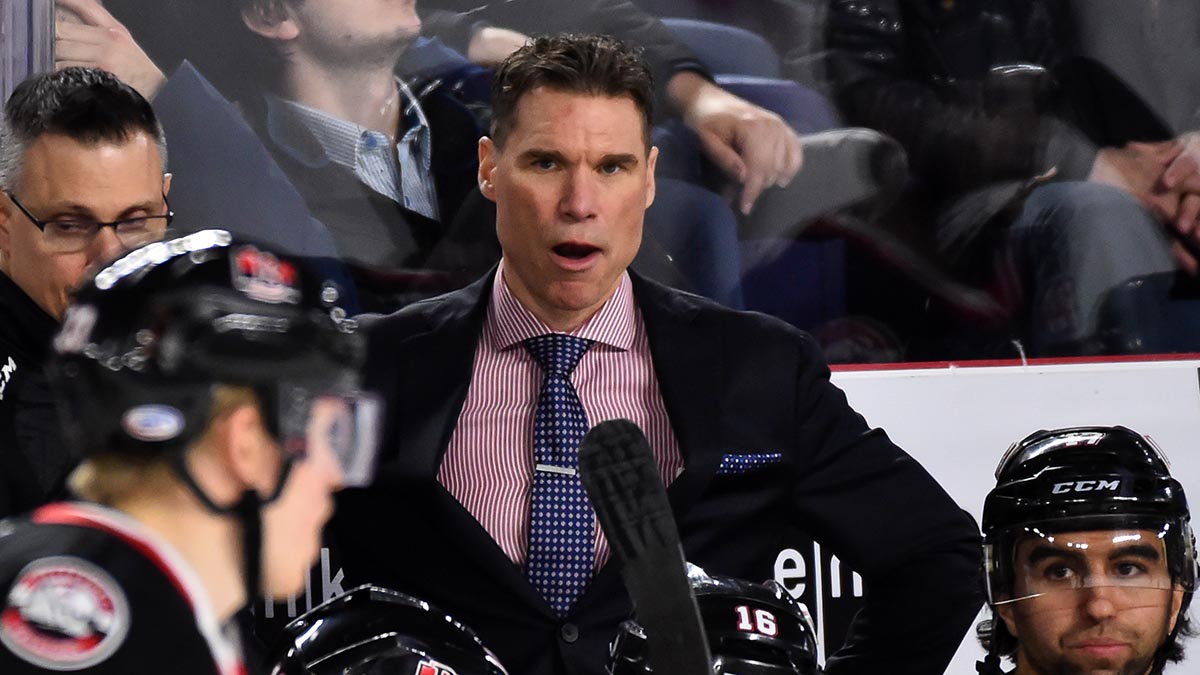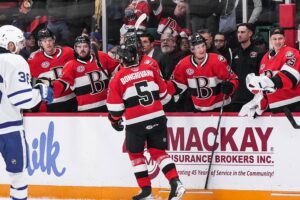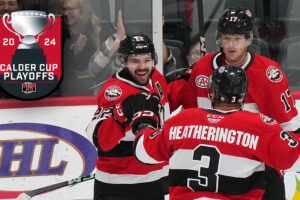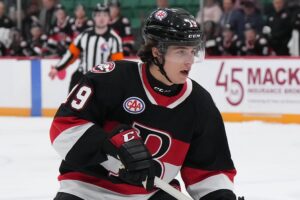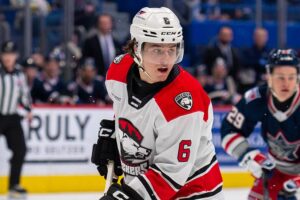📝 by Patrick Williams
Troy Mann standing behind an American Hockey League bench in the Calder Cup Playoffs is nothing new.
But the Belleville Senators bringing postseason hockey to fans around the Bay of Quinte, that is something fresh.
Wednesday, the Senators head coach and his team open a best-of-three first-round series against the Rochester Americans. It has been eight years since an Ottawa Senators AHL affiliate has played a Calder Cup Playoffs contest.
With seven victories in their final eight games, Belleville claimed a fourth-place finish in the North Division with a record of 40-28-4-0 (.583). They concluded their regular season on Saturday afternoon by knocking the arch-rival Toronto Marlies out of playoff contention with a 5-2 win at CAA Arena, their third win in 11 days over the Marlies.
Since Mann took over the Belleville post June 25, 2018, he has played a key role in stabilizing Ottawa’s development affiliate. The likes of Drake Batherson, Erik Brannstrom, Alex Formenton, Josh Norris, and others have developed under Mann’s watch before going on to play key roles in Ottawa. Mann arrived in Belleville following four seasons guiding the Hershey Bears to a pair of Atlantic Division titles and a trip to the 2016 Calder Cup Finals; he also worked four seasons as an assistant coach in Hershey, winning a Calder Cup championship in 2010.
As the B-Sens prepare for postseason play, here are Mann’s thoughts on several issues:
ON WHAT IT MEANS FOR OTTAWA TO HAVE BELLEVILLE IN THE POSTSEASON
“I certainly think when you’ve got a number of prospects developing in the American League, it’s important that they play meaningful hockey. I think it’s an important step.
“I remember talking to our team the week of February 1 about the playoffs, what it was going to take to get in and how many wins, and we’re [25-11-4-0] since. So we’ve done a nice job of getting ourselves there, and there’s kudos to the players for buying in. That’s a lot of meaningful hockey for these prospects, and now they’re going to have to take it to another level. It could be two games. It could be 17 games. We don’t know. But I think it’s critical to help in the overall development of the organization of where [Ottawa] ultimately wants to go with not only the group of prospects that are up there and still young, [but] that next level coming up – [Egor] Sokolov, [Lassi] Thomson, [Viktor] Lodin, [Jacob] Bernard-Docker, Mark Kastelic.
“I mean, there’s another level of prospects here that are going to help Ottawa in the next couple of years.”
ON PINNING DOWN A TEAM IDENTITY IN A CHALLENGING SEASON
“I think that as the season progressed, we as a coaching staff really felt what type of team we needed to be… Almost opposite to the 2019-20 team that was in first place and had all that skill with Batherson, Norris, Logan Brown, Formenton, Brannstrom ― and was just a much different team because we led the league in scoring that year. This year, the team’s been more of a forechecking [club], having to track and play above the puck, play good defensively and have good goaltending, and win those 2-1, 3-2, 4-3 games. We’ve done a lot of that, specifically lately.
“When our team doesn’t play toward its identity, and we’re not disciplined, you can tell. We just don’t get the results. When we do, we’ve had a lot of success. And I have heard through the grapevine that teams are saying that we’re very difficult to play against, and I think that’s important. That feels good as a head coach, but ultimately it also tells you the type of identity that we’ve had to build with this type of roster.”
ON HELPING TO PUT TOGETHER A STRONG AHL OPERATION
“[In 2018-19] we had a new assistant general manager come in with Peter MacTavish. We had some prospects my first year, but he almost overturned the team, to be honest.
“If you go back and look at some of the transactions in my first year, we ultimately had a 17-game point streak that got us in the mix, but he overturned that team with a lot of trades. We had a good team down the stretch and a good balance, but it really started coming into fruition that second year when some of those prospects started graduating. The trade with where we acquired Norris [as part of the Erik Karlsson deal with San Jose], then [Joey] Daccord came in, and there was just that influx. I felt that was a very special team, and it’s kind of sad that the pandemic deterred us from seeing what the potential was in the playoffs.
“We kept the same philosophy last year during the short season, but you’ve got to give it to [Ottawa]. They were adamant about playing last year. They were adamant for our next tier of prospects coming in like Sokolov, [Cole] Reinhardt, [Angus] Crookshank, Thomson. They were really adamant about us playing. I thought that was critical to what we’re doing this year. Sokolov got 35 games. Reinhardt got 35 games.
“To me that 35-game season within that Canadian Division really gave [the prospects an idea of] just what to expect this year.”
ON WHAT HE SOUGHT TO CHANGE AFTER ARRIVING IN BELLEVILLE
“One of the first things I felt was just to install that winning attitude.
“The year I came in, they were coming off a season where they finished [28th in the AHL]. Not necessarily change the culture, but just bring in a different mentality. It was a slow process. We’ve maintained that…the prospects are the number-one priority. They always will be with Ottawa, because drafting is so important. So we have to do our very, very best to try to get as many prospects to the NHL as possible, and you can’t make a lot of mistakes.
“So that’s kind of how we started. We talked playoffs and winning every day here, because to me it’s the only thing I know. It’s probably coming from that Washington-Hershey model where you’re developing the prospects, but ultimately you need to win as well. I’ve tried to instill that here in a combination. I certainly put a lot of pressure on us as a team to win, but to me you can still preach both.”
ON WHAT OTTAWA PROSPECTS CAN GAIN GOING THROUGH THE CALDER CUP PLAYOFFS
“I was mentioning earlier to [development coach] Shean Donovan… We’ve been in playoff mode since early February, and you can tell the intensity of the games as you get closer.
“Because there’s so much on the line… you really find out who can play that level of hockey. If you’re going to be a full-time NHL player and play in the NHL for 10 years, you need to be able to play this time of the year when you’re competing for a playoff spot. You need to be able to raise your game when the stakes are so high, because ultimately you need to do that at the NHL level for 82 games and stay there for 10 years.
“So for me, it’s a mental thing as well in dealing with the pressure of bringing your game and consistency, of bringing your game. You can’t all of a sudden turn it on Wednesday and then not be great Friday. I think it helps with the consistency for players in terms of raising their game and also understanding how hard it is to make the NHL, and that’s what I get out of it.”
ON THE EXPERIENCE OF A DEEP CALDER CUP PLAYOFF RUN
“What I tell the guys is there’s nothing better than coming to the rink in late May [when] there are only four American League teams left or four NHL teams left, when everybody’s at home in the offseason doing their thing.
“I just think it’s a special time to be a hockey coach or hockey player.”
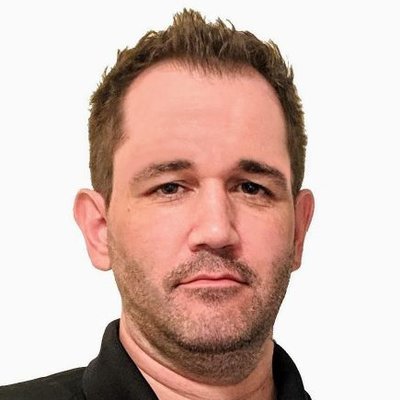
TheAHL.com features writer Patrick Williams has been on the American Hockey League beat for nearly two decades for outlets including NHL.com, Sportsnet, TSN, The Hockey News, SiriusXM NHL Network Radio and SLAM! Sports, and was most recently the co-host of The Hockey News On The ‘A’ podcast. He was the recipient of the AHL’s James H. Ellery Memorial Award for his outstanding coverage of the league in 2016.

































